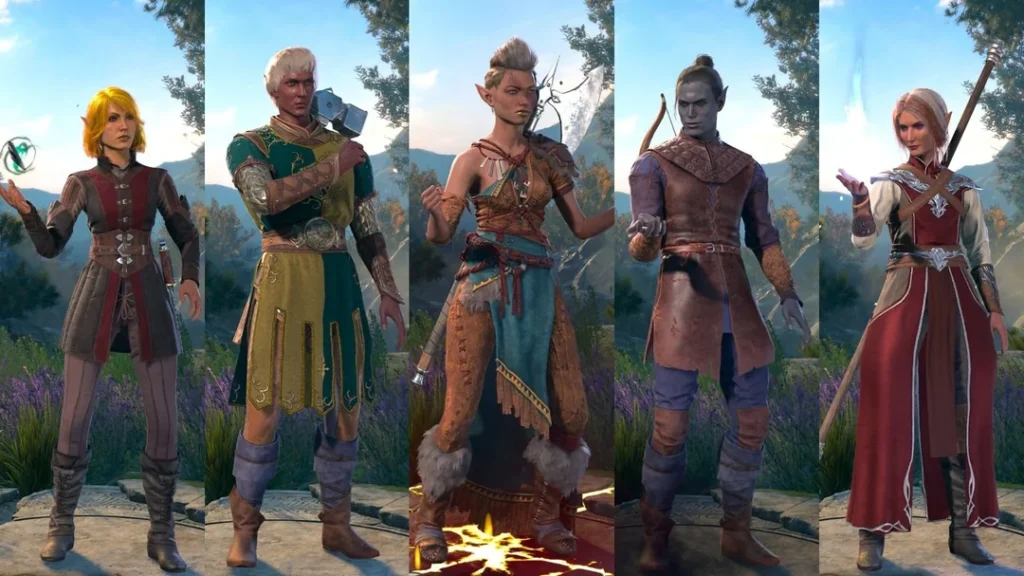Introduction to Player Agency in RPGs
Player agency is a fundamental aspect of role-playing games (RPGs), encapsulating the ability of players to make choices that significantly influence the narrative and gameplay experience. This concept holds immense importance, as it not only enhances immersion but also empowers players to shape their unique stories and experiences within the game. In RPGs, the decisions that players make can lead to diverse outcomes, affecting relationships with characters, altering the game world, and ultimately determining the conclusion of the story.
As we delve into the realm of player agency, two noteworthy games come to the forefront: Baldur’s Gate 3 and Cyberpunk 2077. Both titles have garnered attention for their innovative approaches to player choices and decision-making. Baldur’s Gate 3, rooted in traditional tabletop RPG mechanics, allows players to navigate a rich narrative landscape where decisions echo throughout the game, emphasizing the importance of character development and moral complexity. Conversely, Cyberpunk 2077, with its futuristic setting, offers a different take on player agency, focusing on the consequences of choices against a backdrop of corporate intrigue and societal breakdown.
This blog post aims to evaluate how each game rewards players based on their choices. By comparing the nuanced ways player decisions are integrated into Baldur’s Gate 3 and Cyberpunk 2077, we aim to uncover the distinct methodologies that these games utilize to emphasize player agency. Through this comparative analysis, we will explore how each game’s approach impacts the storyline and game world, offering insight into the evolving nature of RPGs and the critical role that player decisions play in cultivating an engaging narrative experience.
The Decision-Making Mechanics of Baldur’s Gate 3
Baldur’s Gate 3 is a role-playing game that emphasizes player agency through intricate decision-making mechanics. Central to the gameplay experience is the concept that every choice made by the player can significantly influence the narrative, character relationships, and overall plot outcomes. Drawing from its Dungeons & Dragons roots, the game creates a richly layered world where each decision carries weight, fostering a sense of immersion and investment in the unfolding story.
At the heart of Baldur’s Gate 3’s decision-making system is the branching narrative structure, which allows players to explore a variety of different paths. This structure is supported by a variety of dialogue options and interaction mechanics, enabling players to engage with the environment and non-player characters in a meaningful way. For example, choosing to support one faction over another can lead to alliances or enmities that directly impact the gameplay. These choices can also trigger specific quests, alter the availability of resources, and even affect character progression, making it essential for players to carefully consider their selections.
Key moments within the game exemplify the importance of player decisions. During crucial plot points, players may face dilemmas that require weighing their moral alignments against practical outcomes. For instance, a player’s decision to betray a trusted ally can result in immediate advantages but lead to long-term consequences, such as losing potential support in future encounters. Each decision made not only alters the immediate gameplay experience but also shapes the overarching narrative, creating a dynamic storytelling environment that signals the true value of choice in Baldur’s Gate 3.
Cyberpunk 2077: Choices and Consequences
Cyberpunk 2077 is renowned for its intricate narrative structure, where player choices significantly shape the game’s progression and outcomes. The decisions players make throughout the game not only affect the storyline but also influence character relationships and the world around them. Each choice carries weight, leading to branching storylines that ultimately culminate in different endings. The game’s design invites players to engage with its morally complex themes, often forcing them to confront the ethical implications of their actions.
The concept of player agency is pivotal in Cyberpunk 2077, as each decision can have immediate and long-term consequences. For instance, the choice to ally with certain factions or betray others can alter the balance of power in Night City. Additionally, the treatment of key characters—whether to support their ambitions or exploit their vulnerabilities—creates a more personalized experience. These interactions can lead to dramatically different outcomes in character arcs, shaping the fates of allies and adversaries alike.
Certain key scenarios exemplify this dynamic. Players may encounter a mission where they must decide whether to negotiate a peaceful resolution or engage in violence. This decision not only affects the immediate situation but can also ripple throughout the narrative, changing future missions and alliances. Furthermore, Cyberpunk 2077 challenges players to consider the moral shades of gray in each choice, emphasizing that decisions are rarely clear-cut. Such depth ensures that the narrative remains engaging, as players are presented with difficult dilemmas that reflect their values and ethics.
Ultimately, the player’s journey through Cyberpunk 2077 is defined by the consequences of their choices, with the game masterfully weaving these decisions into its expansive world. The ability to experience various narratives based on choices fosters a sense of ownership over the story, encouraging players to explore different paths and outcomes.

Comparative Analysis: Where Do Player Decisions Pay Off More?
When examining the weight of player decisions in both Baldur’s Gate 3 and Cyberpunk 2077, it becomes evident that each game approaches player agency differently, leading to varying levels of impact and satisfaction. Baldur’s Gate 3, a traditional role-playing game (RPG) that leverages its Dungeons & Dragons roots, offers a rich tapestry of character interactions and storylines. In this game, choices are profoundly consequential, often altering the path of the narrative significantly based on a player’s actions. Players frequently report a heightened sense of involvement, given the multiple branching storylines and the diverse character arcs that can result from seemingly small decisions.
On the other hand, Cyberpunk 2077 presents a more modern take on decision-making within an open world setting. While it also allows for impactful choices, many players feel that the consequences are not as deeply woven into the fabric of its narrative. The fast-paced and expansive nature of Night City leads to experiences where player decisions may feel meaningful initially but often revert to a more linear progression over time. This linearity can create a sense of disconnection from the weight of choices, as players navigate through a world brimming with possibilities but often find that the outcome remains somewhat predictable.
Furthermore, player feedback consistently highlights the emotional resonance of choices in Baldur’s Gate 3. In contrast, Cyberpunk 2077, while delivering a rich and immersive world, may not provide the same level of emotional payoff from player decisions, leaving some players yearning for a more profound narrative connection. Consequently, the comparative effectiveness of player choices across these two titles reveals a crucial distinction in how deeply players engage with the story, shaping not only their character’s journey but also their overall gaming experience.

Reflecting on Player Choices in RPGs
As we draw insights from these examples, it is clear that both Baldur’s Gate 3 and Cyberpunk 2077 offer unique perspectives on player decision-making, each contributing to the evolving landscape of RPGs. The level of agency experienced by players significantly shapes their connection to the narrative and ultimately defines whether the decision-making process feels rewarding. Future games in the genre could learn from these approaches, refining how decisions are integrated into gameplay, ensuring that players feel their choices resonate throughout their journey. This understanding of choice impact is vital for developers aiming to create compelling narratives that captivate and engage players long after the credits roll.
